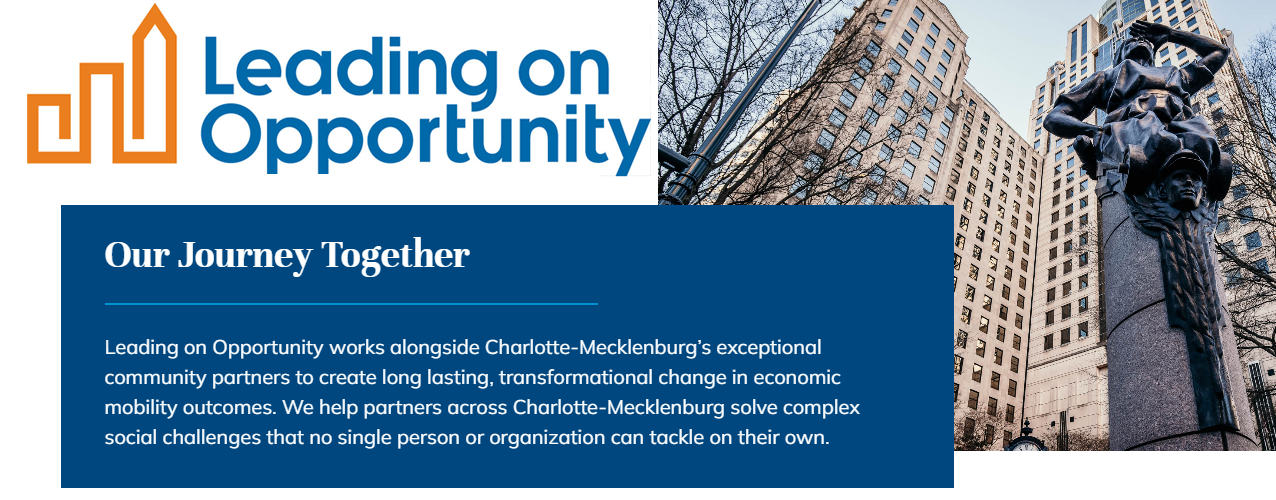
Policy Brief: Transportation as a Lever for Economic Mobility in Charlotte -Mecklenburg
Prepared for: Local Government, Community Stakeholders, and Business Leaders
Prepared by: Leading On Opportunity
***
Background
Charlotte Mecklenburg faces one of the steepest transportation challenges in the nation. With an average one-way commute of 28.3 minutes — the second longest in the U.S. — transportation has emerged as both a barrier and a potential driver of economic mobility. The Opportunity Taskforce Report identifies access to reliable transportation as critical to improving economic mobility. Efficient, affordable, and connected transit systems not only link people to jobs, schools, and services, they also shape long-term economic outcomes for children and families.
Evidence linking Transportation and Mobility
Commute Time and Upward Mobility:
Economist Raj Chetty’s 2018 research found that children raised in areas with short commutes (under 15 minutes) tend to earn more as adults. Reducing local commute times in association with other aspects of opportunity zones were predictive of a 7% increase in adult income, making it one of the most powerful predictors of future economic success.
Education Access and Attendance:
In Minneapolis, a pilot program offering free bus and light rail passes to students reduced absenteeism by 23% after controlling demographics (Fan & Oas. 2015).
Support for Single Parents:
Single parents are more likely to rely on public transit (Wang & Xu, 2020). Without reliable, frequent service, transportation challenges compound the difficulty of managing work, childcare, and household responsibilities.
Labor Market Benefits:
In New York City, neighborhoods with strong public transit access had an unemployment rate of 8.1%, compared to 12.6% in poorly served areas (Kaufman et al., 2015). In Indianapolis, a study of public transit found that increasing accessibility of public transit would have a significant impact on lower-income individuals particularly because of the high concentration of jobs with “good pay” in the downtown area.
Economic Returns:
Nationally, every $1 billion invested in public transit yields $5 billion in GDP and creates 49,700 jobs (American Public Transportation Association, 2020).
***
Challenges In Charlotte
Spatial Mismatch: Many job centers are in opportunity-rich areas poorly connected to transit-dependent neighborhoods
Limited Connectivity: Long travel times and indirect routes limit access to employment, education, healthcare, and childcare.
Affordability and Reliability: Gaps in affordable, frequent service can push low-income residents toward costly or unreliable alternatives.
Policy Recommendations
Invest in High-Frequency, High-Capacity Transit Corridors – Prioritize routes linking low-opportunity neighborhoods with job centers, educational institutions, and childcare hubs.
Reduce Commute Times to Under 15 minutes for Key Areas – Apply Chetty’s findings by targeting Infrastructure and scheduling improvements to shorten travel times.
Expand Transit Access for Youth and Vulnerable Populations – Implement free or reduced-fare programs for students, single parents, and low-income workers.
Integrate Housing and Transportation Planning – Co-locate affordable housing near high-opportunity transit nodes to reduce “Spatial mismatch”.
Measure and Report on Transit Equity Impacts – Use an equity lens to track how investments affect access to opportunity by race, income, and geography.
My Take: This latest policy brief produced by Leading On Opportunity makes a direct correlation between getting from where you are to where you need to be (also known as mobility) and your capacity to be professionally, and personally productive and healthy. Thus, another reason to lend your support to the transportation referendum up for a vote on November 4th. If you are interested in getting more engaged in the effort, let me know.

On October 2, 2025, Rob Nanfelt represented REBIC at the HOT TOPIC: Transportation Referendum for Northern Region Realtors®. Our firm belief is this investment will not only fuel economic mobility but also support the creation of more walkable, interconnected, and livable communities.
Data was shared to show how the passing of this important piece of legislation will, for Charlotte and the region, drive significant investment in roads, rail, and bus systems that will shape the region’s future.
Panelists included:
Mayor Christopher Carney, Town of Mooresville
Mayor Russell Knox, Jr., Town of Davidson
Allen Dargins, Chair, Canopy Realtor® Association Government Affairs Committee and 2026 President-Elect Canopy Realtor® Association
In the second part of the program, attendees had the opportunity to meet and hear directly from candidates running for public office in North Mecklenburg and Iredell Counties.
BACK TO LATEST NEWS